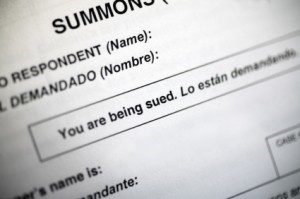
No Need For Repeated Futile Attempts At Service, Court Says
Litigation Law Roundup
Sharp  Thinking
Thinking
No. 154 Perspectives on Developments in the Law from Sharp-Hundley Law Firm, P.C. June 2018
No Need For Repeated Futile
Attempts At Service, Court Says
A process server who is told flatly by the defendant’s spouse that the defendant does not live at an address need not make repeated attempts to serve the defendant at that address, a panel of the Appellate Court in Chicago has ruled.
Ruling in Neighborhood Lending Services, Inc. v. Griffin,  2018 IL App (1st) 162855, the panel noted the extensive efforts that were made to locate another address for the defendant after the spouse made the false statement.
2018 IL App (1st) 162855, the panel noted the extensive efforts that were made to locate another address for the defendant after the spouse made the false statement.
“There is no reason to believe that subsequent visits would have yielded any different results,” the court said, stating there was “nothing requiring the process server to repeatedly engage in knowingly futile visits before attempting a different method of service.”
The court distinguished the spouse’s unequivocal statement from JPMorgan Chase Bank, N.A. v. Ivanov, 2014 IL App (1st) 133553, where an unidentified neighbor in a multi-unit building told the process server that “he heard” defendant had vacated the premises.
Spouse’s Out-Of-Court Statement Not Hearsay, Court Says
Neighborhood Leasing Services, Inc. v. Griffin, 2018 IL App (1st) 162855, discussed above on a different issue, was one of those rare appellate cases where evidence issues are dispositive.
In Neighborhood Leasing the issue was whether the spouse’s  statement that “he doesn’t live here” was barred by the hearsay rule. The court held that it was not.
statement that “he doesn’t live here” was barred by the hearsay rule. The court held that it was not.
“This statement was not used for its truth but was used for its effect on the listener – it provides the reason why the process server did not attempt service again,” the panel said. “Statements offered for their effect on the listener or to explain the subsequent course of conduct of another are not hearsay.”
Hearsay classically is defined as an out-of-court statement offered for the truth of the matter asserted.
Affidavit For Alternate Service Must State Facts
A court order permitting alternate service is not conclusive as to whether a plaintiff has the right to engage in such service.
That’s the message of Urban Partnership Bank v. Ragdale, 2017 IL App (1st) 160773.
Of particular significance is the affidavit required by 735 ILCS 5/2-203.1 to utilize the alternative service procedures. Noting  “there are no magic words” that an affidavit in support of a § 2-203.1 motion must include, the court said the affidavit must “set forth facts that demonstrate a diligent inquiry as to the location of the defendant.”
“there are no magic words” that an affidavit in support of a § 2-203.1 motion must include, the court said the affidavit must “set forth facts that demonstrate a diligent inquiry as to the location of the defendant.”
Because the affidavit supporting the alternate service order was deficient, the panel ruled the trial court never acquired personal jurisdiction over the defendant so served, and it vacated the resulting judgment.
Court May Consider Service Issue Sua Sponte
To ensure that it has the power to enter the impending judgment, Illinois courts have a responsibility to inquire sua sponte as to service on an absent defendant.
So said a panel of the Appellate Court in Chicago in Dore v. Quezada, 2017 IL App (1st) 162142.
Dore dealt with a citation respondent who was “served” by abode service at a place that was not his regular place of abode. On appeal, plaintiff argued that the trial court should not have reached this issue of its own volition.
Analogizing to a sua sponte doctrine in federal courts, the panel rejected that argument. And noting that a return of abode service must show strict compliance with all the requirements of 735 ILCS 5/2-203, it found the attempted service ineffective.
Former Defendants May Be Respondents In Discovery (Again)
Another court has ruled that a party once named as a defendant but dismissed without prejudice can be re-joined to the litigation as a respondent in discovery (RID) under 735 ILCS 5/2-402.
In Prinova Solutions, LLC v. Process Technology Corp. Ltd., 2018 IL App (2d) 170666, the court dealt with a situation where a U.S. defendant was dismissed from a breach-of-contract suit because the contract was with another, foreign entity. When the plaintiff re-filed against the foreign entity, it named the former U.S. defendant as a RID. The RID moved to dismiss. Relying upon Westwood Constr. Group, Inc. v. IRUS Property, LLC, 2016 IL App (1st) 142490 (see Sharp Thinking No. 135 (Oct. 2016)), the court said there was nothing improper about that procedure.
SHARP-HUNDLEY, P.C.
1115 Harrison, Mt. Vernon, IL 62864 • Telephone 618-242-0200 • Facsimile 618-242-1170
www.sharp-hundley.com
Business Transactions • Litigation • Financial Law • Real Estate • Corporate Law • Commercial Disputes • Creditors’
Rights • Arbitration & Mediation • Estate Planning • Probate
154
